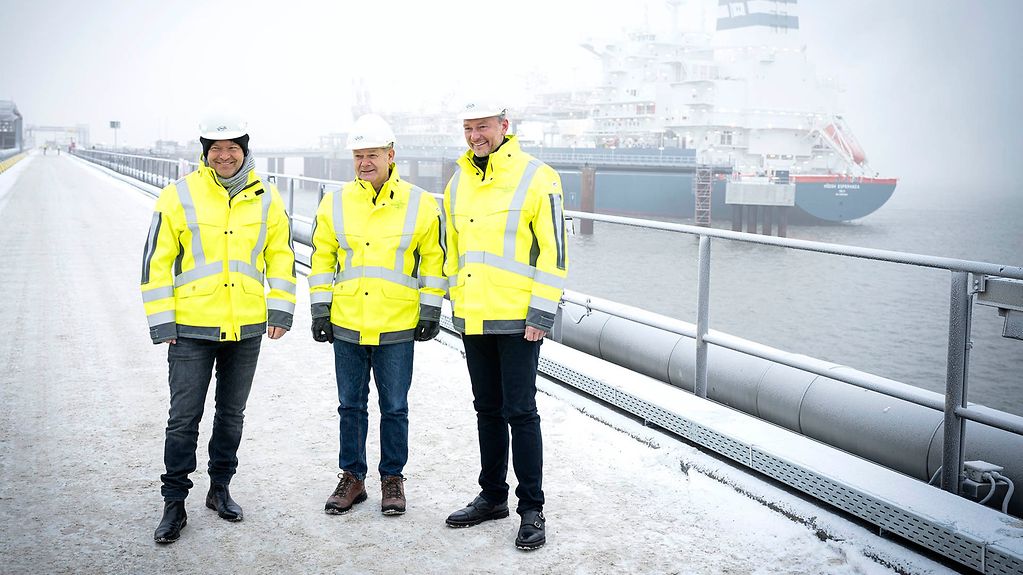Liquefied natural gas (LNG) terminal opens in Wilhelmshaven
Federal Chancellor Scholz said at the opening of the first LNG terminal in Wilhelmshaven: "Today Germany and the European Union will become much more secure and independent." He praised the "extraordinary team effort" and the speed at which the project had been completed. Additional terminals in the North and Baltic Seas are set to follow.
4 min reading time

Federal Chancellor Scholz (m) visits the new terminal together with Vice-Chancellor Habeck (l) and Finance Minister Lindner (r) – the "Esperanza" can be seen in the background.
Photo: Federal Government/Bergmann
26 kilometres of pipeline were constructed in just five months, less than 200 days from planning to commissioning of a new LNG terminal. "This is a new world record," said Federal Chancellor Olaf Scholz at the opening of the new LNG terminal in Wilhelmshaven. Many people would not have thought this possible, Scholz continued, but "we have actually managed to do it," adding that this was now "the new German pace at which we are expanding our infrastructure."
Special ship being used for regasification
The tanker "Höegh Esperanza" docked at the LNG terminal in Wilhelmshaven, Germany, loaded with around 165,000 cubic metres of liquefied natural gas, enough to supply around 50,000 households for a year. The regasification process, i.e. the conversion of the LNG into gas, which is then fed into the German grid, is also carried out aboard this special vessel. The Federal Government has chartered the "Höegh Esperanza" for Wilhelmshaven.
The first regasification will be carried out in the next few days before regular operations commence in the new year. "From now on," said Scholz, "many more ships will be able to dock in Wilhelmshaven and supply many more hundreds of thousands of households and businesses with gas." As of January, the Esperanza will provide an annual regasification capacity of around 5 billion cubic metres and thus represents a first milestone in Germany's future energy supply.
"An outstanding team performance"
Federal Chancellor Scholz thanked everyone who had ensured that the ship and jetty would be operational before Christmas, including the workers, engineers, the many companies involved, the state government of Lower Saxony, and the local municipal authorities. The example demonstrates the viability of German federalism: "Whenever we link arms, we can manage such major tasks in the shortest possible time," the Federal Chancellor stressed. The project of creating an energy-secure Germany had taken "an extraordinary team effort" from its very inception, said Scholz. The same applies to Uniper, he went on to elaborate, a company that has promised to fully utilise the terminal until 2024 and to procure corresponding quantities of LNG on the global market.
Increasing independence from pipeline gas
"Wilhelmshaven is just the beginning," says Scholz. More terminals will follow in the coming weeks and months on the German North Sea and Baltic Sea coasts, in Brunsbüttel, in Stade, and in Lubmin. The plan is to have an import capacity of over 30 billion cubic metres of gas by the end of 2024, which is more than half the volume of gas that flowed through the pipelines from Russia to Germany last year. In addition, there will be further deliveries from Norway and the Netherlands as well as via Dutch, Belgian and French ports, and – for a limited period – from the UK.
"We will not be blackmailed"
"Russia's President Putin thought he could blackmail us by cutting off our gas supplies. But he was mistaken. We will not be blackmailed," declared the Federal Chancellor. At the same time, he said, the horrific war acted as a driver to accelerate "everything that would have had to be done anyway." Germany’s goal is to completely phase out fossil fuels by 2045. Russia's weaponisation of energy is just one more incentive to "invest even sooner, with even more conviction, and even more emphatically in the expansion of renewable energies," said Scholz. This was why the new pipelines in Wilhelmshaven had deliberately been constructed to allow a later conversion for the transport of hydrogen, he said.
Pulling together as a government
The Federal Chancellor was accompanied in Wilhelmshaven by Vice Chancellor Robert Habeck and Minister of Finance Christian Lindner. The Federal Chancellor thanked them both for securing Germany's energy supply this winter, which, he said, "is also thanks to the two of you." "The entire government has pulled together with the federal states and with communities across Germany, who have a responsibility in this matter,” said Vice Chancellor Habeck:
"Our overall progress has been good, but we still have a long way to go. We are continuing to work in a committed manner and are pushing renewable energies with the same determination," said the Vice Chancellor, adding that it was still important to "use gas sparingly as it is still a scarce resource." Finance Minister Lindner also welcomed the commissioning of the first floating LNG terminal before the end of the year, saying that it was important to reduce dependence on Russian gas imports as soon as possible.
LNG is liquefied natural gas. It can be shipped to terminals, where it is converted back into gas and fed into the gas grid, so, at least for part of the way, no pipeline is needed. Later, the same infrastructure is to be used for the distribution of climate-friendly hydrogen.